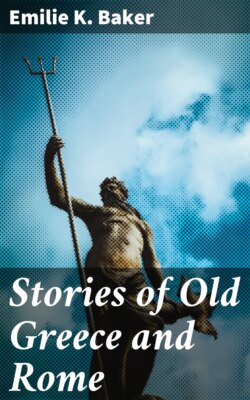Читать книгу Stories of Old Greece and Rome - Emilie K. Baker - Страница 23
На сайте Литреса книга снята с продажи.
I
ОглавлениеTable of Contents
During the childhood of Apollo and Diana the goddess Latona lived happily on the island of Delos, and forgot all her early misfortunes in the joy of her children. As they grew up she boasted of their strength and beauty to all who came to the shores of Delos, and no village or hamlet—however small—but had heard of Latona's children. When Grecian mothers put their little ones to bed at night, they told wonderful tales of an island far out at sea where a brother and sister lived who were fairer than all the flowers in the meadows; and maidens, sighing for a loveliness greater than their own, wove garlands to adorn the shrines of those two who walked the earth in all their immortal grace.
Latona was proud of her children's fame, and boasted of it far and wide. Few mothers cared to dispute her claim, and these spoke only in whispers; but there was one, bolder than the rest, who openly laughed at the goddess's boast and taunted her with having but two such children whom she could praise. This was Niobe, a Grecian princess and the mother of fourteen children—seven sons and seven daughters—all of them fair and strong and godlike in spite of their mortal birth. When Niobe learned that the people in her kingdom were loud in their praises of Latona's children, and were neglecting to honor her own splendid sons and daughters, she was very angry and ordered all the statues of Apollo and Diana to be destroyed; for the people, in their devotion to beauty, had set up many in the temples and the market place. Then she bade a messenger go tell the goddess what had been done, and show her in what contempt the mother of fourteen children held her who had but two.
When Latona received the message she was so enraged at the insult that her desire for revenge knew no bounds. She called Apollo and Diana to her side and commanded them to go forth and slay the children of Niobe. It was easy for Apollo to accomplish his part of the cruel task, for he met the seven sons of Niobe hunting, and slew them so quickly that not one of the brothers had time to ask what he had done to merit the god's wrath. The daughters of Niobe were in the palace with their mother; but this did not daunt the young Diana, who put seven sharp arrows in her quiver, and, bow in hand, went forth to complete Latona's revenge. She found the maidens seated at Niobe's side, weaving, and one by one the remorseless goddess shot them down in spite of their mother's heart-broken cries for mercy. Finding that her entreaties were in vain, and seeing six of her daughters lying dead beside her, the distracted Niobe sought to shield the remaining one with her own body while she prayed wildly to the gods to spare her this one child. But the gods were deaf to her cries, and Diana, fitting the last arrow to her bow, shot the maiden as she cowered in her mother's arms.
Over her fallen body the wretched Niobe wept so long that the gods at last felt pity for her grief, and changed her into stone. This statue was placed by a running stream, and ever afterward the waters were fed by the tears that continued to course down the cheeks of the stone image; and travelers came from foreign lands to gaze on this marvel of a devoted mother who could not cease from mourning for her children even when turned into stone.
